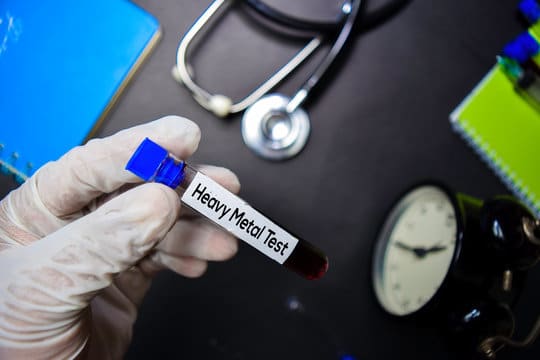Heavy metals are present in many foodstuffs that you may eat every day. These metals may even be in the products that you use on your body. These metals are even present naturally in the environment.
Since they are so common, it raises questions. Most importantly, why are metals used in products and why people eat or drink substances with these metals in them?
Most of the metals present in your foods and other stuff are safe for you. However, some of the heavy metals can be harmful to your body. These metals get the name heavy because they are dense, actually heavy, and found in the earth's crust.
Some heavy metals are known for causing different sorts of health issues, such as lead, mercury, arsenic, and cadmium. While the authorities try their best to monitor and remove these four elements from foods and other products, they can sometimes still get through. You could experience a range of illnesses by consuming heavy metals, and heavy metal poisoning may be the most serious condition.
Let’s learn about foods that contain heavy metals, heavy metal poisoning, easy heavy metal testing kits, and more.
Common Foods Containing Heavy Metals
Unfortunately, some of the things in your diet may be exposing you to heavy metals. Even though eating these foods may seem healthy, they could be harming your health.
Fishes are incredibly common foods, and they have many health benefits. However, many fishes contain the heavy metal known as mercury. You should check the fishes you eat for mercury on the internet. Generally, smaller fishes contain much less mercury than bigger ones.
Bone broth is commonly used in many foods worldwide. However, it may contain some amount of lead. However, that doesn't mean you should swear off bone broth. You should simply consume it in moderation.
Rice may be among the most popularly consumed foods worldwide. You can eat rice with a lot of dishes, and there are many delicious rice recipes. However, some rice contains the heavy metal known as arsenic. This is generally absorbed through pesticides in the soil, irrigation water, or the cooking water you may use. But, like other foods, you can still consume in moderation.
How You Can Be Exposed To Heavy Metals
Other than the common foods mentioned above, there are plenty more ways of absorbing heavy metals into your body.
However, you should remember that health problems related to heavy metals only arise after being frequently exposed to these metals. If you've been exposed but rarely or occasionally, then you should have nothing to worry about. Yet still, it's better to be safe than sorry.
Therefore, here are some ways you could be exposed to heavy metals:
- Working in or around a hazardous waste site
- Ingesting pesticides, herbicides, or insecticides
- Your residential area having high levels of water, soil, and rocks
- Drinking contaminated water
- Vaping contaminated e-juices
- Inhaling cigarette smoke
- Being in gun ranges
- Using certain cosmetics
- Manufacturing vacuum pumps, mirrors, incandescent lights
Heavy Metal Poisoning
With frequent exposure, your body may start to accumulate heavy metals. When there is a certain amount of accumulation, you may suffer from heavy metal poisoning.
While some heavy metals may be useful to eat in minor amounts, you should not consume or absorb them for a long duration. Sometimes, heavy metal poisoning can lead to fatal diseases.
If you have a large volume of heavy metals in your body, you may begin experiencing some harmful side effects. Depending on the toxicity and the type of metal you have the most in your system, you could be experiencing the following symptoms:
- Fatigue
- Nausea
- Vomiting
- Diarrhea
- Headaches
- Cramping
- Stomach pains
In severe heavy metal poisoning cases, you could end up with more terrible illnesses like organ failure.
Fortunately, the situation can be easily dealt with if you have been exposed to heavy metals. After properly testing your level of exposure, you would be given some medication. These meds will bind with the metals and remove them from your body.
Since heavy metal poisoning can be quite dangerous if not handled in time, you should take heavy metals tests after a certain period to be safe.
Testing For Heavy Metals
Testing your body for heavy metals is not as complicated as it may sound. Instead, it can be an easy and simple process.
Generally, you will need to test yourself for heavy metals for two reasons. The first one being you would like to do a regular check to determine if you're on the safe side or not. The second is your doctor asked you to monitor the levels to ensure your medication is proving to be effective.
In either case, you can easily purchase a heavy metal testing kit from Osumex. They have different kits for various metals, and you can check yourself for as many as you want. The testing kit is easy and simple for anyone to use. You can check your early morning urine, tap water, or other solutions for heavy metals.
Heavy Metal Detoxing
If you find yourself having more than the safe amount of heavy metals in your body, you should go to a doctor and get a checkup. While they may prescribe medication to get better, you can also do a heavy metal detox along or instead of taking the meds. Either way, it would be useful to consult your physician first.
In the heavy metal detox, you eat more of the foods that bind to these metals and remove them from your body. Therefore, you should consume and avoid certain foods during the detox.
The food you should eat are:
- Garlic
- Lemon water
- Cilantro
- Curry
- Tomatoes
- Atlantic dulse
- Spirulina
- Green tea
- Probiotics
- Wild blueberries
- Chlorella
- Barley grass juice powder
The foods that you should consider avoiding are:
- Alcohol
- Non-organic foods
- Fish, especially larger ones
- Rice, especially brown rice
Furthermore, you should increase your intake of vitamins and minerals to get well sooner. If you aren't getting the recommended daily intake of vitamins, look into supplements.



